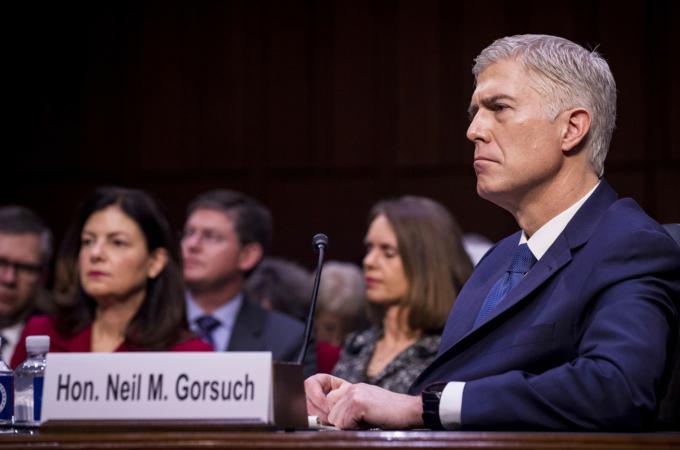Trying to Bork Judge Gorsuch
Last week the Senate Judiciary Committee held several days of hearings on President Trump's nomination of Judge Neil M. Gorsuch to the United States Supreme Court as successor to Justice Antonin Scalia, who died over a year ago. Judge Gorsuch, who is an Episcopalian, albeit one educated in Catholic schools, would be the first Protestant on the Court since the retirement of Justice John Paul Stevens a number of years ago. The present eight-member Supreme Court is composed of five "born" or ethnic Catholics, and three ethnic Jews -- somewhat unusual in Supreme Court history, since for most of its 225+ years, it has been overwhelmingly dominated by Protestants.
Judge Gorsuch has a distinguished 10-year history on the U.S. Court of Appeals for the Tenth Circuit, which sits in Denver, Colorado -- Judge Gorsuch's home state. There, he has participated in deciding thousands of appeals. He has a documented record of judging fairly and impartially, and of writing clear and convincing opinions. He went to Columbia University for college, and then on to Harvard Law School for his J.D. and Oxford University for a doctorate in legal philosophy. He wrote a dissertation on the subject of assisted suicide and euthanasia, later published as a book, with Professor John Finnis, the famous natural law scholar and Australian convert to Catholicism, as his dissertation adviser. He has ruled on a number of occasions in favor of religious freedom.
President Donald J. Trump, like all Republican presidents since Ronald Reagan, has pledged to appoint judges who would overturn Roe v. Wade, which constitutionalized an effective right to abortion on demand. And Democrats, for their part, have sadly become the party of legalized abortion, at least since 1972. And so the stage was set for yet another example of the abortion issue effectively poisoning the judicial confirmation process. The most notorious instance of this was the 1987 hearings on Judge Robert Bork by President Reagan. Judge Bork had written critically about the dubious constitutional basis for Roe v. Wade, and thus he was made out to be a proponent of coat-hanger abortions at his hearings. An academic judge who was forthright and honest about his views, irrespective of the politics of the matter, he was easily caricatured and the Senate handily defeated his nomination.
While there were never enough votes on the Court to reverse Roe v. Wade, there will not be if Judge Gorsuch is confirmed. Indeed its central holding was reaffirmed in the 1992 decision of Planned Parenthood of Southeastern Pennsylvania v. Casey. Abortion and more recently gay marriage as constitutional rights have become litmus tests (on both sides, I might add) when it comes to judicial nominations. What's wrong with this picture is the politicization of the judiciary -- but it's what you can expect when judges decide cases based not on the constitution and the laws, and what they actually say -- which is nothing about either abortion or gay marriage -- but rather on their own personal views, and how they feel the cases should turn out in terms of result.
And so what we saw at the confirmation hearings of Judge Gorsuch was an eminently qualified jurist, given the highest rating by the American Bar Association, raked over the coals because he supposedly was favoring corporations over "living individuals." In fact, he was deciding cases where the binding constitutional or statutory law (as in the Hobby Lobby case dealing with Obamacare's contraceptive mandate) made corporations legal persons. Sometimes he ruled in their favor; sometimes, he ruled against them. It depended on what the relevant facts and the applicable law was. This is the essence of fair judging, to be open-minded and impartial in applying the law, without fear or favor, irrespective of persons. That is why justice is portrayed as a blindfolded woman holding a weighing scale. Judging should be blind in the sense that it decides cases evenhandedly on the merits, rather than on the identity of the parties -- rich or poor, white or black, male or female, native or immigrant. That is what "Equal Justice Under Law" inscribed on the Supreme Court building and expressive of the constitutional right of Equal Protection of the Law, guarantees everyone.
Let's see if Judge Gorsuch survives the threatened filibuster against his nomination. I think he should.
- Dwight G. Duncan is professor at UMass School of Law Dartmouth. He holds degrees in both civil and canon law.



















